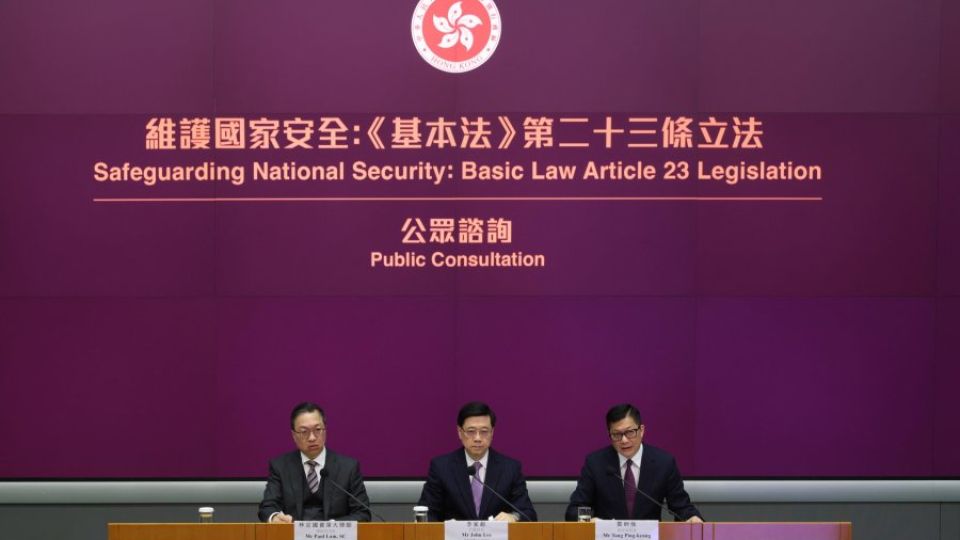January 30, 2024
HONG KONG – Hong Kong will enact a brand-new security ordinance to address national security risks, Chief Executive John Lee Ka-chiu announced at a press conference on Tuesday morning, the same day that the city begins a monthlong public consultation on the legislation of Article 23 of the Basic Law.
The public consultation on the ordinance, proposed to be titled “Safeguarding National Security Ordinance”, will end on Feb 28.
Lee said that enacting Article 23 legislation is a constitutional duty of the Hong Kong SAR, which has remained unfulfilled since the city’s return to the motherland.
Click for the consultation paper and related documents: Public Consultation Document
Article 23 of the Hong Kong Basic Law requires the SAR to enact laws on its own to prohibit seven categories of acts that endanger national security, including treason, sedition, subversion, and theft of State secrets.
Some of the crimes are already covered by the National Security Law for Hong Kong, which took effect on June 30, 2020, prohibiting secession, subversion, terrorist activities, and collusion with a foreign country or external elements to endanger national security.
The legislative principle of Article 23 is rooted in the “one country, two systems” principle, focusing on safeguarding national sovereignty, security, and development interests, said Lee
After the social unrest in 2019, the importance of national security has become evident. Given the volatile international situation and increasing geopolitical complexity, it is crucial to address Hong Kong’s national security shortcomings as soon as possible, Lee said.
Lee said that the legislative principle of Article 23 is rooted in the “one country, two systems” principle, focusing on safeguarding national sovereignty, security, and development interests.
Simultaneously, the law will uphold human rights, respecting and protecting residents’ freedoms within the boundaries of the law, he added.
Lee also mentioned that the legislation will take into account Hong Kong’s situation and the relevant laws of other countries.
He said that many countries, including the United States, the United Kingdom, Canada, Singapore, and New Zealand, have security laws.
Additionally, Lee provided an overview of the consultation document, which includes legislative principles and approaches, such as amending existing laws to convert common law offenses into statute law.
The document will also list national security laws from foreign countries for public reference.
Lee said that the consultation document would be released soon. Lee also said that he, along with Secretary for Security Tang Ping-keung and Secretary for Justice Lam Ting-kwok, will provide a detailed introduction to the document at the legislative council meeting on Tuesday afternoon.
Sufficient explanation
Lee noted that Lam and Tang will lead the explanation work, with other government departments working in coordination as well. He said the government welcomes suggestions from residents during the consultation period, mentioning that the consultation document could be accessed online, while hard copies would also be distributed to the public.
Thematic briefings will be held, not only for Hong Kong residents but also for foreign consulates and chambers of commerce.
Lee emphasized that the government will ensure that people understand that the ongoing legislative work will bring safety, stability, and a favorable business environment to Hong Kong, benefiting both local and international people.
Good for economy, freedoms protected
He reiterated that the legislation would not impose a negative impact on the economy. Using the example that people will not invest in a place where there is a war, Lee emphasized that the development of economic activities requires a safe and stable social environment. The NSL and the soon-to-be-completed Safeguarding National Security Ordinance will consolidate Hong Kong’s environment for free economic development.
When asked whether the government would approve protests against the legislation of Article 23, Lee said that the lawful freedoms and rights currently enjoyed by Hong Kong residents will continue to be upheld.
Emphasizing the need to abide by the law when residents exercise any rights and freedoms, Lee said the legitimate rights and interests of the residents will be fully safeguarded, including their participation in public activities or practicing any trades.
The rights and freedoms are clearly stated in the Basic Law, NSL, and two international covenants — the International Covenant on Civil and Political Rights and the International Covenant on Economic, Social and Cultural Rights. He reiterated that any cases brought to court will ensure compliance with these standards, and any public activities will be conducted in accordance with the relevant laws.
Lam, who also attended the conference, said that the NSL already covers the offenses of secession and subversion against the Central People’s Government, as outlined in Article 23. Therefore, there is no need for additional local legislation specifically targeting secession and subversion.
However, Article 23 legislation should focus on prohibiting other behaviors and activities that endanger national security, ensuring close alignment with the NSL to establish an effective and complementary national security system.
Lam also said that the legislation this time should establish mechanisms for effectively implementing and enforcing both the NSL and Article 23. This includes enhancing law enforcement powers and improving litigation procedures.
Tang said that the consultation document will include nine chapters.
Chapters 1 and 2 will focus on the constitutional responsibility of the Hong Kong Special Administrative Region to safeguard national security, the national security risks faced by the SAR, and the necessity for legislation. These chapters explain the legislative principles, considerations, and research methodology, he said.
Chapters 3 to 7 delve into the proposals on offenses, specifically addressing the five major types of national security-endangering acts and activities. The majority of these proposals revolve around enhancing the existing laws while new offenses will be introduced in accordance with the situation of the city. Chapter 3 focuses on treason and related acts, while Chapter 7 deals with the offense of external interference, said the security chief.
Additionally, Chapter 4 covers acts such as sedition, incitement, mutiny, rebellion, and seditious intent, Tang said.


